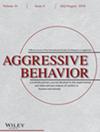Despite evidence suggesting that partner maltreatment—a concept which represents a wide array of negative, destructive, and abusive behaviors in romantic relationships—is likely to fluctuate over time, the longitudinal trajectory of partner maltreatment is unclear. This study aims to identify the average trajectory of partner maltreatment over a 5-month period before applying an attachment-informed diathesis-stress framework to explain points of escalation or de-escalation in partner maltreatment perpetration. Two hundred and eight individuals completed 5 monthly assessments of partner maltreatment as well as an assessment of adult attachment and perceived stress at baseline. A nonlinear (i.e., quadratic function) trajectory provided optimal fit for partner maltreatment perpetration over time. An interaction between attachment avoidance and perceived stress predicted the trajectory of partner maltreatment perpetration. Specifically, higher attachment avoidance and higher perceived stress predicted a small initial decline followed by a steep increase in partner maltreatment perpetration. No significant associations were found for the interaction between attachment anxiety and stress and partner maltreatment. The findings suggest that perpetration of partner maltreatment fluctuates over time, and that an attachment-informed diathesis-stress framework can be applied to explain levels of partner maltreatment perpetration and points of escalation and de-escalation over time.


